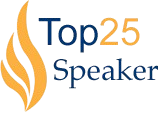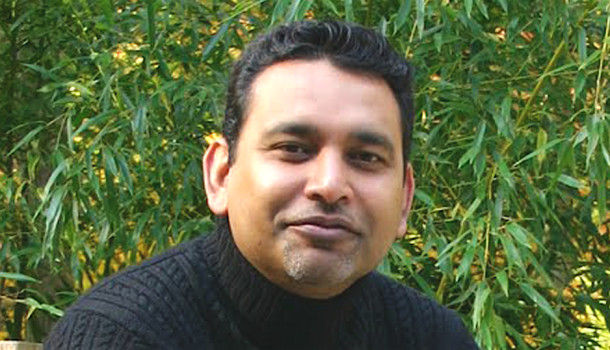
As a renowned thinker, and authority in mindful leadership, Faisal Hoque is frequently invited to speak at business conferences worldwide about leadership, management, innovation, and entrepreneurship.

His books, blog, and articles on innovation, entrepreneurship, creativity, and building resilience attract readers worldwide, including many high profile CEOs. His latest book is Survive to Thrive – 27 Practices of Resilient Entrepreneurs, Innovators, And Leaders . He shares his guidance and ideas for young business leaders through Twitter and as a regular contributor to Fast Company, The Business Insider, and the Huffington Post.
When a leader, entrepreneur, or professional practice mindfulness they are better able to connect the dots between past, present, and future.
SPEAKING.COM: You grew up in Bangladesh. What role has eastern culture played in your thought process and career?
HOQUE: I left my native home Bangladesh when I was 17 for US. Spending my childhood in Bangladesh and adulthood in US taught me some critical life lessons:
• A deep understanding of human suffering
• An inventive mindset to tackle problems with limited resources
• Resiliency
• Western entrepreneurial soul with eastern philosophical foundations
• A love for creativity and innovation that combines both art and science
SPEAKING.COM: What sets “mindful leadership” apart from leadership?
HOQUE: When a leader, entrepreneur, or professional practice mindfulness they are better able to connect the dots between past, present, and future. As a result, they usually create more sustainable solutions and values.
Several decades ago, the term ‘mindfulness’ implied Eastern mysticism related to the spiritual journey of a person, rooted in Buddhist, Hindu, and ancient Chinese philosophies. Today, mindfulness is less about a spiritual journey and more about awareness and focus.
There are two fundamental forces at play that cause resistance to change.
• An internal limitation that causes a person to feel like they are unable to change;
• The inability to keep up with the external change around them.
Those two factors are equally applicable to organizations as they are to individuals. Organizations are nothing but collections of people, so when the leaders cannot help others overcome those internal and external change factors, businesses cannot move forward.
So how does a business or an individual counteract these two forces and become more open to change? It is through mindfulness – the ability to provide undivided attention to your inner world, your outer world, and the impact of your actions.
It’s no surprise then, that the “meditation and mindfulness industry raked in nearly $1 billion” last year (according to a Forbes report). Mindfulness is now practiced by corporations, entrepreneurs, educational institutes, and military organizations alike.
SPEAKING.COM: Can you explain the underpinnings of a sustainable organization?
HOQUE: One of the greatest challenges business leaders and, by extension, their enterprises face in today’s disruptive world is the ability to respond quickly to constant, unforeseen changes. The inability to do so is what makes a team irrelevant and underperforming.
Agility, by definition, is a business’s response to change—at the organizational level, it isn’t about changing one time, but rather creating a culture that constantly practices change through creativity and innovation.
Being different has always mattered, but now it matters even more. Setting yourself apart from the competition is Entrepreneurship 101, but it’s since evolved into putting yourself into a whole new world. Why compete on the same playing field when you can invent a whole new one and make up the rules as you go along?
Sustainability comes from creating a culture of agility, innovation, and repeated operational execution.
If change is embedded in the organization, through good times and bad times, changing to escape a period of turmoil usually does not seem like such a foreign concept.
SPEAKING.COM: How does a leader transform an underperforming team?
HOQUE: Although it takes more than just this to lead through turmoil, here are three essential principles that you can begin implementing right away to start turning around your troubled team:
Assess to navigate: The first step to improvement is to understand the current situation. Selecting the right success indicators to drive our activities helps us identify the tasks that we can knock out first in order to make the greatest impact. Begin with evaluating present capabilities to execute, focusing on your assets, structure, and capacity.
Set a vision to redefine purpose: We have a natural tendency to move toward the light, and making the most of a bad situation is the best way to regain momentum. In turmoil, it is paramount for a leader to define and communicate the right vision. During turmoil, motivational leaders know how to create a sense of self-worth in their teams by making them feel good about the urgency and the tasks at hand.
Build a culture that sparks execution: If change is embedded in the organization, through good times and bad times, changing to escape a period of turmoil usually does not seem like such a foreign concept. The two critical drivers for such a culture are experimentation and responsibility. When things are going well, innovation tends to offer incremental benefits, but when we need to make wholesale changes, the ability to experiment can often transform the situation entirely. When a team owns the route out of the quagmire, the next time they fall in one they will be ever more confident that they will get out of trouble again.
SPEAKING.COM: Your most recent book Survive to Thrive examines successful leaders who had to overcome a variety of obstacles to accomplish their goals. Who are a few of the people profiled in your book?
HOQUE: Along with our own life lessons, the book highlights stories from all walks of life such as:
Brad Feld – Managing director at Foundry Group in Boulder, Colorado. Brad has been an early stage investor and entrepreneur since 1987.
Julie Wainwright – Founder of TheRealReal, technology industry veteran, e-commerce pioneer, and brand management expert whose career spans more than 25 years.
Kamal Ravikant – Serial entrepreneur, angel investor, and author of several books including Love Yourself Like Your Life Depends On It.
The need for approval from others destroys our freedom to succeed on our own terms.
SPEAKING.COM: You write that resilience is like a muscle: “the more you train it, the better it will perform.” What are some ways you can train your resilience?
HOQUE: Among other things, resiliency comes from self-compassion, gratitude, being ok with imperfection, and being devoted to building your skills.
Self-compassion: There are three components of self-compassion:
• Self-love
• Self-expression
• Self-confidence
It’s from self-acceptance that we discover the complexities of our emotions, vulnerabilities, and imperfections. That’s the basis of true authenticity — without which we’re usually unable to grow to our full potential, because we wind up wasting our energies where we shouldn’t. The need for approval from others destroys our freedom to succeed on our own terms.
Gratitude: No matter how self-motivated or driven we may be, external forces are constantly shaping our lives. Successful people don’t take things for granted. They consciously practice gratitude. If you’re making a fresh start of any kind, you’ll need to do the same.
The act of showing gratitude isn’t just a one-way thing, after all. It changes our lives in a handful of ways:
• It makes us more patient.
• It boosts our self-confidence.
• It fortifies our relationships with others.
• It helps us rethink our goals and determine why they matter.
Be okay with imperfection: Paradoxically, it’s only by embracing imperfection that we maximize our chances of success. Setting unrealistic standards leads us to dismiss talented people out of hand, ignore big opportunities, and fail to contribute our all to worthy causes. Holding out for something better, in other words, usually leaves us worse for the wear.
As one ancient folk adage has it, “If you pull the string too tight, it will snap. If you leave it too loose, it won’t make music when plucked.” Adjust your expectations before you set out on something new. Know that the outcome can still fall short of your ideal and still count as success.
Devotion: When we feel there is no one to call upon for help, it is ultimately our skills that save us. We master our skills by constantly pushing ourselves with devoted effort — devotion that allows us to craft our authentic calling by connecting the dots between our inner world and outer world. You have to stay in the game in order to win.
Faisal Hoque ON Speaking
All of my talks are delivered with real life stories and examples, immediate practical how-tos, and access to digital tools/apps for daily practice.

HOQUE: Since I speak at a variety of venues and audiences, typically my talks are tailor made for a speaking engagement. Here are some sample takeaways:
- How to reinvent with an entrepreneurial mindset
- How to lead and transform in the age of creativity and innovation
- Why leadership is both poetry and plumbing
All of my talks are delivered with real life stories and examples, immediate practical how-tos, and access to digital tools/apps for daily practice.
SPEAKING.COM: What kind of special prep work do you do prior to an event? How do you prepare for your speaking engagements?
HOQUE: I study the goals and objective of the events, organizers, and attendees. I do prep calls – and depending on the situation go over the draft material with the organizers before finalizes them.
SPEAKING.COM: Have you had any particularly memorable speaking engagements / unusual situations arise while on the road?
HOQUE: No two engagements or situations are alike. I have been very fortunate to speak across the globe at events, corporations, govt. agencies, and universities. Often the journey/travel/people make things more memorable than anything else.
During my speaking engagements, I have traveled through a winter storm from NYC to Muskat; visited many historic spiritual sites in Japan, India, and Israel; bonded with US Marine personnel; and have been deeply inspired at MIT, Yale, and the NY Stock Exchange. I am grateful for each of these unique and memorable experiences, as they have continuously shaped my thinking, writing, speaking, and my own business practices.
SPEAKING.COM: What types of audiences would most benefit from your message?
HOQUE: Businesses, leaders, educators, university students, entrepreneurs, and government/non-profit agencies.
SPEAKING.COM: Which of your keynote speaking topics are your favorites and why?
HOQUE: I love talking about innovation, entrepreneurship, and sustainability that combines systemic thinking (i.e. agility, culture, organization, process, technology) and emotional intelligence (i.e. mindset, resiliency, mindfulness, creativity).
SPEAKING.COM: What inspired you to start doing speaking engagements?
HOQUE: I have been a hands-on product developer, entrepreneur, and business leader throughout my career. I never thought that I would become an author or a speaker, yet 15 years ago I started writing books. One thing led to another: I started to do media appearances and people started to invite me for speaking. Today I remain a-hands-on business operator and investor, using my own work and life experiences as the basis of my publications and speaking programs.
SPEAKING.COM: What are some of the successes you’ve helped clients achieve?
HOQUE: I’ve helped numerous clients and companies foster cultures that created sustainable growth. I have done this with cross industry, private and public sector global brands such as GE, MasterCard, American Express, Northrop Grumman, PepsiCo, IBM, Home Depot, Netscape, Infosys, French Social Security Services, Gartner, Cambridge Technology Partners, JP Morgan Chase, CSC, and others.
Original Interview @ Speaking.com.















